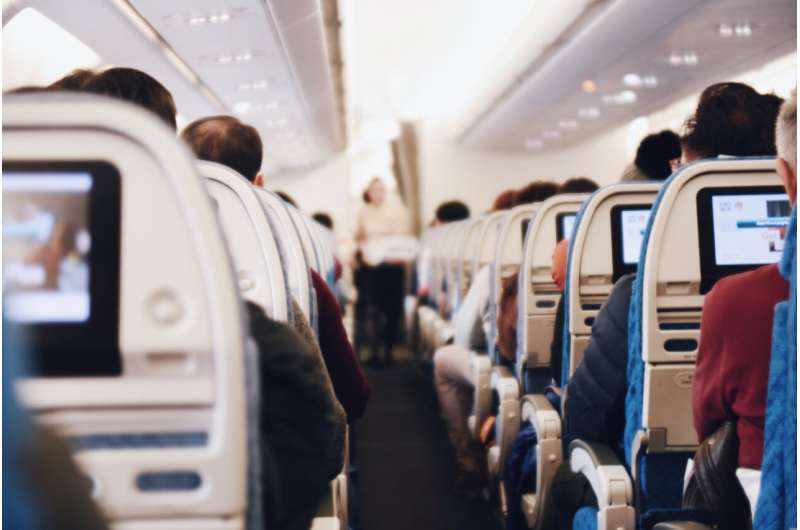This article has been reviewed according to Science X's editorial process and policies. Editors have highlighted the following attributes while ensuring the content's credibility:
fact-checked
trusted source
proofread
Researchers explore causes of air passengers' turbulent behavior

Incidents of passenger misconduct on airplanes—which are increasingly being shared in the news and on social media—are predominantly caused by passenger intoxication, according to a new study by University of Texas at Dallas researchers.
Dr. Sheryl Skaggs, professor of sociology in the School of Economic, Political and Policy Sciences (EPPS), and Dr. Lynne M. Vieraitis, professor of criminology in EPPS, studied data from more than 915 incidents reported to the Aviation Safety Reporting System over a 21-year period, from 1999 to 2020.
In their study published in Deviant Behavior, Skaggs and Vieraitis found that passengers' consumption of alcohol was a significant contributor to misconduct, which the study defines as behavior by passengers that is abusive or unruly, antagonizing crew members and passengers, or compromising the safety of the flight.
The misconduct incidents in the data set were voluntarily reported by crew members and included personal accounts. The researchers reviewed each narrative and found that 15% of the incidents involved physical misconduct, 46% were verbal misconduct, and 39% involved the failure to follow a crew's commands regarding such actions as smoking in the lavatory, using electronic devices and storing luggage.
The researchers excluded incidents of sexual misconduct from their analysis and deliberately did not include data gathered during the COVID-19 pandemic.
"We excluded the COVID-19 years because we saw a big increase in incident reports, and most of those were related to mask-wearing. That would have skewed the data and obscured what we were trying to study," Vieraitis said.
While alcohol consumption fuels most passengers' unruly actions, the study authors said other factors, such as poor customer service, also can escalate passenger misbehavior on airplanes. For example, when passengers encounter delays but aren't made aware of what's going on with their flight, they can become agitated, Skaggs said.
"This is a hot-button issue for a lot of passengers. If there's a lack of communication from the airline about flight delays or other problems, that tends to escalate people's frustrations, even before they get on the flight," she said.
Skaggs said other precipitating factors include the dearth of personal space and the lack of a visible presence of law enforcement on board the plane.
"Aircraft designs have evolved to where passengers are cramped, so leg space is limited unless you're paying higher prices for first class or exit rows," she said. "The flights are also just more crowded, so you have people who are confined to tight spaces, which tends to escalate tempers and frustration levels."
One way to mitigate problems is to increase monitoring of intoxication before passengers board flights, Skaggs said.
"In a number of instances that we reviewed, people were already intoxicated as they were boarding the aircraft, and gate personnel are not necessarily on the lookout for intoxicated passengers," she said. "I think more personnel to monitor those situations where passengers are demonstrating signs of intoxication would help."
Despite the media attention on passenger misconduct, these incidents remain relatively rare on the thousands of flights that take off every day, Vieraitis said.
"Most flights are perfectly fine. There are no hostile exchanges, no one yelling, no one punching," she said. "At the same time, it can be a serious problem for people who have to fly and those who have to work in these conditions. It's not fair to go to a job where you're trapped in a confined space with no access to law enforcement, and then you are physically or verbally attacked."
Skaggs, whose research focuses on diversity and gender issues in the workplace, said that flight attendants—79.2% of whom are women, according to the Federal Aviation Administration—bear the brunt of passenger frustrations and unruly behavior.
"It's taking a mental toll on flight attendants," she said. "There have been a number of incidents where flight attendants have had teeth knocked out or have been knocked unconscious. There's definitely a gender process at play here; a lot of people think that they can be more aggressive toward female flight attendants."
More information: Sheryl Skaggs et al, Flying the not-so-friendly skies: airline passenger misconduct, 1999-2020, Deviant Behavior (2023). DOI: 10.1080/01639625.2023.2234068

















